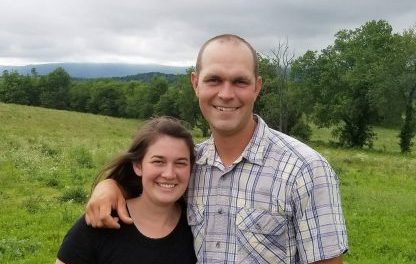
CASE STUDY: CREAMBROOK FARM
“Creambrook is now one of the farms we like bragging about. What they’re doing is very unusual in terms of sustainability and is on the high-end when it comes to their practices and their marketing. It’s a nice community story.” – Sally Dodge, Iroquois Valley Farmland REIT (IQVF)
A Natural Born Entrepreneur
Ben Beichler of Creambrook Farm was the first full-time farmer in his family in five generations. He apprenticed for a year at Joel Salatin’s Polyface Farm in 2007, where he met his business partner and future wife, Kristen.
After working for others and renting properties for a few years, Kristen and Ben recognized the need to specialize and felt a pull toward the dairy industry. Ben continued to work in his farming role with the goal of eventually owning a dairy farm. He met Ted LeBow when KTC was providing coaching support to his current employer, The Family Cow. Ben asked Ted to mentor him on his journey to business ownership.
“Around 2015, [Kristen and I] were both disgruntled with dairy careers. Our biggest issue was [that] we could never secure land. We felt at the bottom of the totem pole and had no leverage. Out of frustration, we decided that if we were going to do this for the rest of our lives, why don’t we buy a place.” – Ben Beichler
When Ben left The Family Cow, he met with Ted every Monday afternoon. Ben and Kristen wanted to buy a farm, but it was a big financial risk and wanted to proceed with caution. Ted assured them that if they had a plan and experience, money would be the easy part.
Finding a Source of Funding
In 2016, Ben and Kristen started seriously farm shopping. They researched many options, from Wisconsin to Missouri. Ben continued to work for an industry-leading, grass-based, low input organic dairy the entire time. Ted recognized Ben’s drive. After connecting with Iroquois Valley Farmland REIT (IQVF) at a NOFA Conference, he mentioned IQVF to Ben as a potential funding avenue.
Iroquois Valley was founded in 2007 by Dave Miller and Dr. Steve Rivard as a food and farmland company making impact investments in organic and local agriculture through private funding. As a Certified B Corp, IQVF focuses on the triple bottom line principles, where financial stability, environmental health and a generational commitment to family farmers are monumental.
But First, Financials!
Ted was very clear about the need to have solid financials before reaching out to IQVF. When Ben and Kristen finally found a farm in Virginia, it was the most expensive property they had looked at but it checked a lot of boxes. Ben sheepishly came to Ted about the farm. Ted said, “Show me the money can work and I’ll introduce you to Iroquois”.
Ben had no real budgeting or spreadsheet experience. Their sessions were detail-oriented to support Ben and Kristen’s goal to purchase the $1.8M farm and successfully operate an organic dairy. Ted and Ben worked for 20-30 minutes every week for about 8 months and used KTC’s model Chart of Accounts to understand the scale and type of business that would be required to support this property.
Over time, Ben’s weekly “bootcamp with Ted” led to the development of a comprehensive business management toolbox and skills to help the farm:
- Build a budget
- Navigate financial obstacles
- Understand when and how to make purchases
- Create a project plan with logical steps
- Explore lender communication strategy and techniques
- Learn multi-party negotiation skills
- Design and implement contingency plans
When Ted felt that Ben truly understood the financials and felt confident with these new skills, he introduced him to IQVF.
Now the Real Fun Begins
Ted arranged a meeting between Ben and IQVF in the Fall of 2016. Iroquois Valley pointed out that their plan left only a small margin for error. Ben focused on the fact that IQVF didn’t say “no” and powered forward.
By the time the official green light was given, Ben would endure negotiations between an agricultural-oriented bank, IQVF, his realtor, a family member, and the property owner. He remained tenacious throughout the process, eventually putting together a deal that proved to multiple financiers that he can solve problems and understood how to make a profit. In the end, Ben’s tenacity made the deal possible, but his clear understanding of finances was critical in finalizing the agreement.
The Easy Part
Since the agreement, Creambrook has established a strong direct marketing customer base and developed healthy gross margins. Ben and Kristen continue to work through problems with confidence and with an eye on profit that’s not clouded by passion due to their solid financial foundation, clear chart of accounts, and awareness of how to course correct. They also remain hyper-aware of local food’s shifting landscape and the modern consumer’s needs.
“People want food with integrity,” Ben stated firmly. “We ask ourselves how we can be more than a milk farm and create an experience and genuine connection that goes beyond the product. We are very active in conversation with our customers…. To a degree, the farm purchase was the easy part.”
The Future of Community Supported Agriculture
As Clair Mesesan of Iroquois Valley Farmland REIT pointed out, “the whole movement is not going to take off if everyone has to be accredited. …to have real mass change, people who have less money need to be able to get involved. It’s going to take work, but it’s possible.”